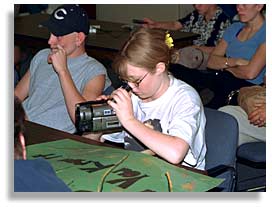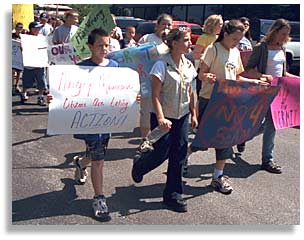|
An interview with Fred Campbell
Grass roots communications from Canada to Appalachia Interview by Nic Paget-Clarke
The following interview with Fred Campbell (part 2) is part of a series of interviews with some of the members of a group of 25 artists from around the U.S. and Canada who went to Kentucky and Virginia to participate in the initial stages of a multi-year, multi-site community art project sponsored by the American Festival Project. The American Festival Project is based in Whitesburg, Kentucky with Appalshop, a regional community arts center. Also see: Rodrigo Duarte Clark, Harrell Fletcher, Shannon Hummel, Stephanie Juno, Suzanne Lacy, John Malpede, Robbie McCauley, Nobuko Miyamoto. In Motion Magazine: I’m not familiar with that history. Fred Campbell: During the re-settlement period that we were talking about, Challenge for Change was a National Film Board Canadian process where they started using film ... . Did you see “Stranger with a Camera”? In Motion Magazine: Yes. Was the man who was killed part of Challenge of Change? Fred Campbell: I think so. Anyway, that’s what was happening in Canada. Directors were being sent all over the country using black and white film, and later, video, to participate in positive social change. It was called Challenge for Change. Resettlement was taking place in Newfoundland. The National Film Board came to Newfoundland looking for a good place to do something so they consulted the university rural extension service and ended up sending a film crew to Fogo Island. They made a series of non-edited films of people talking about resettlement, in the ’60s. Then, they took it to the decision makers in the city and let them listen to what ordinary people had to say. They also brought a lot of information about the co-ops because the Rural Extension field workers felt the co-ops were a good idea. Well, the people eventually did form a big coop and they didn’t move from Fogo Island. They are still there. It’s been described as the Fogo Process -- using film in communities directed towards a positive social change. Helping people have dialogue in the community. But I think it’s exaggerated, the effect. Even material by the National Film Board only talked about enhancing a process. But you’ll find other people who talk about it as “bringing the gift of light” to these “primitive rural barbarians”. That kind of concept. Anyway, my point was, the local has a priority when you are working as an outside intervenor. It’s the local process that’s most important. You might be able to be of small assistance but you have to be very careful about trying to take credit for any kind of changes that happen just because you were part of the process. The eloquence of the ordinary human being In Motion Magazine: What have you been doing this week? How do you feel about it? Fred Campbell: I was here in ’97 working with some community health people. That’s when I met some Appalshop people. I first heard about this happening a year ago. When I came it was more like stepping in to the same stream. It’s like a relationship. You have a relationship and you meet one weekend and then by chance you are back together again. I didn’t have any concept of being project oriented. I knew that the approach being taken was very similar to the approach that I take, and I knew that the people that I had met before were very similar to the rural people that I work with. I didn’t really feel I was going to a strange place. If I had been taken to Detroit or Los Angeles or Montreal or Toronto I would feel much more in a strange place. When we drove down to the community, I knew we were moving into a process that was already underway. The artists that were with me had a little apprehension, were a little confused about where we were going. But, as soon as the next day started, the kids were there and there was work to do. Soon we were in the communities. I was in a situation which was so familiar, in which I find the eloquence of the ordinary human being, wherever, when talking about their own issues, is incredible. It always makes everything worthwhile. It’s a great reward. I feel humbled and lucky to be allowed to listen to these ordinary people expressing their views. It is respect for them, one of the most crucial things in this kind of work. It’s respect for the kids that are doing the stuff. Respect for the ordinary people. But it was all familiar to me. It was a reinforcement, a very positive reinforcement of things I believe in. That’s how the whole week went.
The kids were great. It’s what I’m used to. I’m used to rural kids. There’s an interesting politeness, sauciness, quick to form relationships with people about rural kids. One of the things I’ve wondered about is their unique school. The state closed their school down and wanted them to go to a consolidated school but they had this tradition of their own school in the community and they fought it. They got private funding to build that big building. The deal was, as I understand it, they provide the building and the resources and the state brought the salaries for the teachers in it. That’s an interesting concept, eh? What I’m wondering is, does that kind of environment lead towards youth who are more outspoken and have a greater sense of community? Which they certainly do. In Motion Magazine: What do you think about the process of the week? Fred Campbell: The experience in the community was positive all the way. It was a learning experience. It was an affirmation of things I believe in. There were no complaints even though we had five people living in a small place on an intense schedule. With people knocking on our doors at six. The kids were there bright and early. You’d come down and the kids were already there. The kids were giving us orders - or giving me orders any way. They took charge. At one point, somebody asked me about that. I said in my opinion what you are experiencing is rural hospitality. Those kids are responsible for us. It’s a self imposed responsibility and it’s tied in with rural hospitality. You have a guest. If you come to my house as a guest and I say, “Here is some food” and you say, “I’m not hungry” it throws the whole thing into a loop. In these rural environments there are certain standards of hospitality, a mode of being hospitable and we were their guests. And that’s how they saw it. They were taking care of us. Saying things like, “We spent too much time down at the school. Are you OK?” But it wasn’t fake. It was very easy to have a reciprocal caring for where they were. “Are you going to get home tonight ok?” That kind of concern. “Are you hungry now” So you have these kids. And we were going into people’s homes in the community because how they had us eat was we were always invited to somebody’s house. We had a pot luck one time but we had to buy food and take it with us which I thought was really neat. We would help prepare supper in the people’s homes. It was pretty intense. But it was positive. I’ve been in that circumstance with a lot of people and there’s going to be a little bit of whining here and there. A little bit of grumpiness getting up in the morning. Nothing. No sharp words. With this intense event of the protest in the middle of it. The whole thing absolutely smooth. The other thing was, it was a lot easier for me in the community because I’m in my element. I’m just doing what I do. It’s easy for me. But the others, coming from these urban areas, suddenly thrust in, not having a clear sense of what they were to do, they quickly became part of the process of constructing the radio piece. The intellectual exercise of deciding what was the gist of what was being communicated. They just took to it. In meeting those people, they all had backgrounds of social commitment. Whether they were chosen because they had backgrounds of social commitment, or not, they all had social commitment. When we went to setting up, when we went to the organizing meeting for the demo, they fit right in to helping plan it. They did it quite well. The people made suggestions and the suggestions were accepted and even asked for. It was all done in a very respectful way. They went to work with the kids the next day. There was a collaborative arrival at what they were going to do. Plus they had a lot of other kids besides the media kids, twenty-five or thirty. It worked perfectly. And then of course there was the event in Frankfort. The week was almost too good to be true. A really, really good experience. I’m not quite sure what is happening now, in these discussions at the end of the week. It’s not really my milieu. I have friends who do this discussion, lengthy discussion, and they usually let me go off. Dismiss me. It’s not a particular skill of mine. Some people have that skill and I respect it very much. It’s very necessary to do. If I were in charge, I’d probably put some media event around it to make it more interesting, like some guitarists to liven it up.
Published in In Motion Magazine October 15, 2000 |
|||||||||||||||||||||||||||
If you have any thoughts on this or would like to contribute to an ongoing discussion in the  What is New? || Affirmative Action || Art Changes || Autonomy: Chiapas - California || Community Images || Education Rights || E-mail, Opinions and Discussion || En español || Essays from Ireland || Global Eyes || Healthcare || Human Rights/Civil Rights || Piri Thomas || Photo of the Week || QA: Interviews || Region || Rural America || Search || Donate || To be notified of new articles || Survey || In Motion Magazine's Store || In Motion Magazine Staff || In Unity Book of Photos || Links Around The World NPC Productions Copyright © 1995-2020 NPC Productions as a compilation. All Rights Reserved. |
|||||||||||||||||||||||||||



